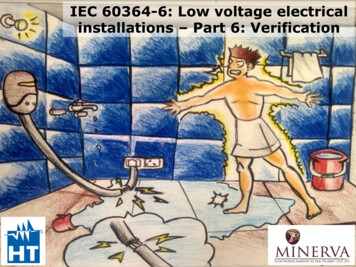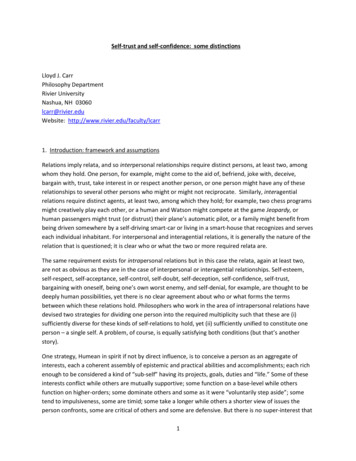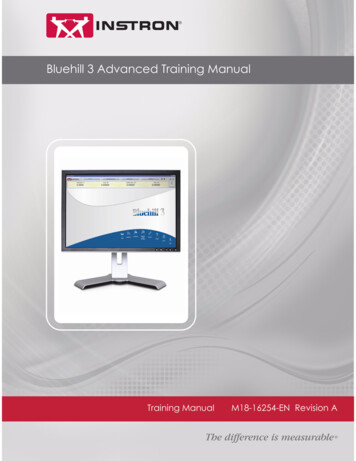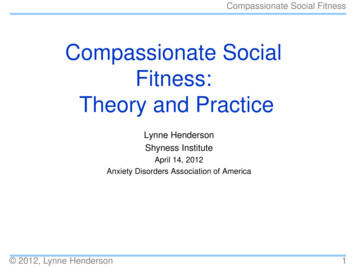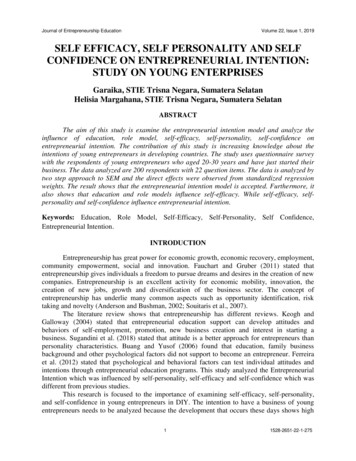
Transcription
Self-disconnection and self-rationing: decisionPublicationdate:19 October 2020Contact:Arina Cosac, Senior ManagerTeam:Retail Directorate, Retail Policy TeamEmail:CDConsultations@ofgem.gov.ukThis document outlines our decision to introduce a package of measures to improveoutcomes for prepayment meter consumers who self-disconnect and self-ration, andfor customers who struggle to pay their energy bills. This decision follows extensivestakeholder engagement over the past two years and our statutory consultationdated 29 June 2020.This document outlines the reasons for our decision to modify the relevant supplylicence conditions, as well as the decision that the licence changes will take effect onand from 15 December 2020.
Decision – Decision on self-disconnection and self-rationing Crown copyright 2020The text of this document may be reproduced (excluding logos) under and in accordancewith the terms of the Open Government Licence.Without prejudice to the generality of the terms of the Open Government Licence thematerial that is reproduced must be acknowledged as Crown copyright and the documenttitle of this document must be specified in that acknowledgement.Any enquiries related to the text of this publication should be sent to Ofgem at:10 South Colonnade, Canary Wharf, London, E14 4PU. Alternatively, please call Ofgem on0207 901 7000.This publication is available at www.ofgem.gov.uk. Any enquiries regarding the use andre-use of this information resource should be sent to: psi@nationalarchives.gsi.gov.uk1
Decision – Decision on self-disconnection and self-rationingContentsExecutive summary . 31.Introduction . 4This decision . 4Next steps . 5Context and related publications . 62.Identifying self-disconnection and self-rationing . 12Summary of decision . 12Identification of self-disconnection . 12Statutory consultation proposal . 12Our decision . 13Considering stakeholders’ views . 14Identification of self-rationing . 18Statutory consultation proposal . 18Our decision . 19Considering stakeholders’ views . 193.Credit functions to reduce temporary self-disconnection and self-rationing: emergency, friendly-hours and additional support credit . 21Summary of decision . 21Emergency and friendly-hours . 22Statutory consultation proposal . 22Our decision . 23Considering stakeholders’ views . 23Additional support credit . 25Statutory consultation proposal . 25Our decision . 26Considering stakeholders’ views . 274.Ability to Pay principles to reduce ongoing self-disconnection and self-rationing . 31Summary of decision . 31Ability to Pay principles . 32Statutory consultation proposal . 32Our decision . 33Considering stakeholders’ views . 342
Decision – Decision on self-disconnection and self-rationingExecutive summaryImproving outcomes for prepayment customers and those struggling with billsWe want to see a retail market that works for all, delivering a quality customer service andmeeting the specific needs of consumers, including those in vulnerable circumstances. TheCOVID-19 crisis has caused additional challenges for consumers, particularly those whohave experienced difficulty in topping-up their prepayment meters (PPMs) whilst selfisolating and those who have been impacted financially as a result of the crisis. We haveworked closely with the government and industry throughout the COVID-19 crisis to ensureenergy consumers’ interests are protected, and we have been pleased to see suppliersstepping up to the challenge to support impacted consumers.We have now decided to introduce a package of measures to improve outcomes forcustomers who struggle to pay their energy bills as well as for PPM customers who go offsupply or ‘self-disconnect’ and those who deliberately limit or ‘self-ration’ their energy useto pay for other goods and services. This decision follows extensive stakeholderengagement over the past two years and our June 2020 statutory consultation.PPM customers are more likely to be vulnerable and in fuel poverty, and they face the riskof going off supply if they do not top-up their meters. We have decided to introduce newlicence requirements on suppliers to identify PPM customers who are self-disconnecting andto offer short-term support through emergency and friendly-hours credit as well as to offeradditional support credit to PPM customers in vulnerable situations who have selfdisconnected or self-rationed. Some suppliers have already demonstrated they are offeringsupport to PPM customers, which we welcome. This package of measures builds on currentpractices to drive up consumer standards.We are also introducing enhanced requirements on suppliers to support all customers whoare facing financial difficulties through the inclusion of updated Ability to Pay principles inthe supply licence. These are principles that suppliers must consider when ascertainingcustomers’ ability to pay in relation to debt repayments. This will ensure consistency acrossthe market and emphasise the need for targeted support for customers in paymentdifficulties. This includes PPM customers who may be at risk of self-disconnection and selfrationing as well as customers on credit meters who are self-rationing their energy use.The changes set out in the modification notices published alongside this document will takeeffect on and from 15 December 2020. We will closely monitor consumer outcomes in thisarea, particularly as we head into the winter.3
Decision – Decision on self-disconnection and self-rationing1. IntroductionThis decision1.1.This document outlines our decision to introduce new protections for domesticcustomers with a prepayment meter (PPM) who self-disconnect and self-ration, anddomestic customers more generally who struggle to pay their bills. We have decidedto proceed with the proposals set out in the statutory notices we published in June2020, with some minor changes to the supply licence conditions to clarify our policyintent and correct typographical errors. This document and the accompanyingmodification notices highlight all the changes we have made following our statutoryconsultation proposals.11.2.We received 27 responses to our June 2020 statutory consultation.2 We havecarefully considered and taken into account stakeholders’ views. In this document,we outline the reasons for the decisions we have taken and their intended effect. Forthe sake of brevity, we have not sought to repeat entirely the rationale andevidence base set out in our August 2019 policy consultation and June 2020statutory consultation but instead refer to these documents where necessary.1.3.In this decision, we discuss: The context to protecting PPM customers who self-disconnect and self-ration,and customers who are struggling to pay their bills (Chapter 1, this chapter); Our decision to introduce a new requirement on suppliers to take all reasonablesteps to identify all PPM customers who are self-disconnecting and to offerappropriate support in line with current and new obligations, giving dueconsideration to vulnerable consumers, as well as the decision to maintain ourposition to not introduce any new requirements on suppliers to identify selfrationing at this time (Chapter 2);The final modification notices published alongside this document are available online es/self-disconnection-and-self-rationing-decision2 Ofgem (2020) Self-disconnection and self-rationing final proposals – statutory consultation14
Decision – Decision on self-disconnection and self-rationing Our decision to introduce new requirements on suppliers to offer emergency andfriendly-hours credit to all PPM customers and to offer additional support creditto PPM customers in vulnerable circumstances who self-disconnect or self-ration(Chapter 3); and Our decision to introduce updated Ability to Pay principles in the electricity andgas supply licences to ensure consistent support for customers struggling to paytheir bills (Chapter 4).1.4. Alongside this document, we have published:Notices of modification and reasons for the decision to modify the standardconditions of the electricity and gas supply licences – the changes to standardlicence conditions SLC 27 and SLC 28, and the introduction of SLC 27A; and Final Impact Assessment – updated Impact Assessment following stakeholdercomments at statutory consultation.3 While the Final Impact Assessment showsthere is an increase in the monetised costs of introducing these measures, we havedecided to proceed with the introduction of these new requirements, particularlygiven the significant hard-to-monetise benefits for consumers the evidencepresents.Next steps1.5.The changes set out in the modification notices published alongside this documentwill take effect on and from 15 December 2020.1.6.These protections form part of our implementation of the Consumer VulnerabilityStrategy 2025.4 We will be keeping a close eye on consumer outcomes in this area,as part of our enhanced monitoring during the COVID-19 crisis and through ourregular monitoring regarding PPM and vulnerable consumers. We will use ourThe final modification notices and final Impact Assessment published alongside this document areavailable online at: self-disconnection-and-selfrationing-decision4 Ofgem (2019) Consumer Vulnerability Strategy 202535
Decision – Decision on self-disconnection and self-rationingCOVID-19 RFI and Social Obligations Reporting as key mechanisms for monitoringthe scale of self-disconnection and consumer debt.5 In turn, our monitoring of selfdisconnection will allow us to better understand the effectiveness of our policy andsuppliers’ compliance with the new rules.1.7.We will also continue to gather information from our consumer engagement surveysand evidence from consumer representatives on the experiences of PPM customersand those who are struggling to pay, including utilising our tripartite agreement withCitizens Advice and the Energy Ombudsman.61.8.We will use our publications, such as regular reporting on consumer vulnerability, toreport on self-disconnection trends and publicise good practice where this is possibleto help suppliers identify potential improvements.Context and related publications1.9.In line with our principal objective of protecting the interests of consumers, ourConsumer Vulnerability Strategy 2025 committed to strengthening protections forPPM customers and those who are struggling with their bills. This is particularlyimportant because of an increase in the levels of self-disconnections over the pasttwo years.1.10. There are a reported 4.3 million electricity and 3.4 million gas PPM consumers.7 Ourdata shows that 1 in 7 customers self-disconnected during 2019, and more recentdata from Citizens Advice shows these numbers could be higher.8 Evidence showsthat around half of those who are self-disconnecting appear to experience anegative impact.9 This could be a physical impact such as living in a cold homeand/or emotional impact which includes financial distress. Some groups willgenerally be more affected than others such as households including children and/orthe elderly.Ofgem (2019) Consumer Vulnerability Strategy: reporting on progressOfgem (2019) Tripartite Group Engagement7 Ofgem (2019) Supplier Request for Information – data correct as of October 20198 Ofgem (2020) Consumer Engagement Survey 20199 Citizens Advice (2018) Switched On – Improving support for prepayment consumers who’ve selfdisconnected566
Decision – Decision on self-disconnection and self-rationing1.11. More recently, the COVID-19 crisis has caused additional challenges for some PPMcustomers, particularly those who have experienced difficulty in topping-up theirPPM whilst self-isolating and those who have been impacted financially as a result ofthe crisis.1.12. When carrying out our review into self-disconnection, we received evidence thatthere was variation in the levels of support offered by suppliers to customers whowere self-disconnecting and/or struggling to pay their bills, and that the level ofsupport offered by some suppliers fell short of our expectations. We thereforeconsulted on proposals to address these concerns in our policy consultation inAugust 2019 and our statutory consultation in June 2020.1.13. The related publications are: Our November 2018 call for evidence: Ofgem (2018) Prepayment self-disconnectionand self-rationing – a call for evidence ll-evidence Our August 2019 policy consultation: Ofgem (2019) Proposals to improve outcomesfor consumers who experience self-disconnection and ng Our October 2019 Consumer Vulnerability Strategy 2025: Ofgem (2019) ConsumerVulnerability Strategy 2025 onsumer-vulnerability-strategy-2025 Our June 2020 statutory consultation and accompanying documents: Ofgem (2020)Self-disconnection and self-rationing final proposals – statutory inal-proposals-statutory-consultationWider policy linkages1.14. In response to the statutory consultation, four suppliers and one consumer groupargued that some solutions sit outside of energy companies’ remit and widergovernment policy needs to address people’s affordability challenges. Severalstakeholders noted the need for Ofgem to work together with government7
Decision – Decision on self-disconnection and self-rationingdepartments, such as the Department for Business, Energy and Industrial Strategy(BEIS) and the Department for Work and Pensions (DWP) to address issues thataffect energy consumers.1.15. We are fully committed to working with the government to protect energyconsumers and we regularly engage with them on issues that have an impact onenergy consumers such as the implementation of Universal Credit and, morerecently, the COVID-19 crisis. The decisions we have made in this documentcomplement the government’s wider work on affordability and fuel poverty, as wellas on the smart metering rollout programme. There are also links with otherregulatory reforms and collaborative work that Ofgem undertakes. Below we haveoutlined the latest information on policy developments that may be of particularinterest.Smart metering rollout programme1.16. Several stakeholders called for the prioritisation of PPM customers as part of thesmart meter rollout. They highlighted the advantages of smart PPMs particularly forcustomers who are in vulnerable situations and for those who are more likely to beaffected by COVID-19 this winter (eg people who are shielding). They also noted theadditional benefits of smart PPMs in relation to the proposed new requirements onsuppliers to identify self-disconnection and to offer credit facilities, all of which canbe accessed more easily and quickly compared to traditional meters.1.17. Our evidence shows that COVID-19 has brought home to consumers theconsiderable benefits of smart meters over traditional meters. In particular, smartPPM customers can top-up and track credit without leaving home and in turn avoidthe risk of going off supply that some traditional PPM customers may experience iftheir top-up shop is closed or if they are shielding. Energy suppliers can also easilysee when smart PPM customers have gone off supply, allowing them to offer timelyand remote support.1.18. Significant progress has been made in resolving technical issues which previouslylimited the ability of suppliers to deploy SMETS2 prepayment meters in the north of8
Decision – Decision on self-disconnection and self-rationingEngland and Scotland.10 In light of this increasing eligibility, it is important thatenergy suppliers should consider how they could prioritise their smart services toPPM consumers so that they can realise the significant benefits of having a smartmeter as soon as possible. We will continue to work closely with government,energy suppliers and consumer groups to promote the benefits of the rollout ofsmart meters to PPM customers. This means, working with industry to monitor andaddress emerging issues and ensuring that energy supplier customer journeys areappropriately tailored for PPM and vulnerable customers and actively promotingsmart meters.1.19. In October 2019, we consulted on proposals requiring larger energy suppliers toreport on their annual plans to roll out smart meters to PPM customers. Thisincluded our minded-to position to require larger energy suppliers to publish theplanned split of their annual milestone delivery to credit and PPM customers.11 Weindicated that we did not see any disadvantages to this information being published.With the government having published its decision on the new regulatoryframework12 for the smart meter rollout due to commence on 1 July 2021, we arereviewing our reporting proposals and will publish our decision in due course.Warm Home Discount (WHD) scheme1.20. Several stakeholders called for Ofgem to work with the government to expand andextend the current WHD scheme. BEIS is responsible for WHD policy. Ofgem’s role isto administer certain elements of the scheme. We note that BEIS has recentlypublished its consultation on a proposal to extend the WHD scheme until April2022.13 We will be responding to this consultation, as well as continuing to engagewith BEIS on its programme of work in this area.SMETS2 prepayment meters are already widely available for consumers in other parts of GreatBritain.11 Ofgem (2019) Statutory Consultation on the Post-2020 Smart Meter Rollout ReportingRequirements12 BEIS (2020) Smart meter policy framework post 202013 BEIS (2020) Warm Home Discount Scheme 2021 to 2022109
Decision – Decision on self-disconnection and self-rationingRestricted meters1.21. Two stakeholders raised concerns about the experiences of restricted metercustomers, a particular concern in Scotland. In September 2020, we published astatutory consultation to make changes to standard licence condition 22G of theelectricity supply licence, which relates to protections for customers with certaintypes of restricted (multi-rate) meters.14 We consulted on changes to lengthen theperiod of time when SLC 22G applies to electricity suppliers. The consultation closedon 2 October. We are currently considering stakeholder responses and we willprovide an update in due course.Breathing Space initiative1.22. Two stakeholders commented on the links between our proposals and thegovernment’s Breathing Space initiative in England and Wales to help people inproblem debt15, with one seeking further clarity on how this fits with the Ability toPay principles. A similar scheme is already available in Scotland.161.23. Breathing Space will provide a period of up to 60 days, where people in problemdebt would be protected from enforcement action by their creditors and the accrualof further interest and fees on their debts. This protection will help those in problemdebt move towards a sustainable debt solution. The protections from enforcementaction, fees and charges will encourage more people to seek out debt advice and toseek it earlier.1.24. As mentioned in our August 2019 policy consultation, we have been engaging withthe government on the implementation of this scheme across the energy sector. Wenote that the government’s proposals in this area should not conflict with our ownrules and encourage suppliers to engage with the government on theimplementation of the Breathing Space initiative in England and Wales.Ofgem (2020) Statutory Consultation: Extending protections for non-E7 restricted meter customers(SLC 22G)15 HMT (2019) Breathing space scheme: consultation on a policy proposal16 Accountant in Bankruptcy (2019) Debt Arrangement Scheme (DAS)1410
Decision – Decision on self-disconnection and self-rationing1.25. The government recently laid out Regulations in Parliament, and expect the schemeto come into force in May 2021.17 It will publish guidance for creditors on theimplementation of Breathing Space shortly and we encourage suppliers to carefullyread this guidance.Third Party Deductions scheme1.26. One stakeholder raised a concern around the use of Third Party Deductions(formerly known as Fuel Direct) by energy suppliers, their obligations under thesupply licence and the guidance provided by DWP who manage the scheme. Theirconcern is that they believe there is a misalignment in these policies regarding whena customer is be able to repay a debt directly out of their benefits payment, viaThird Party Deductions. We can confirm that this is an area we have been engagingwith DWP on and we are currently discussing this matter further to ensureconsistency of approach. We also note that Citizens Advice are currently undertakingresearch exploring suppliers’ and consumers’ experiences with the Third PartyDeductions scheme for energy debt and we will be closely analysing the findings.Your feedbackGeneral feedback1.27. We are keen to receive your comments about this report. We’d also like to get youranswers to these questions: Do you have any comments about the overall quality of this document? Do you have any comments about its tone and content? Was it easy to read and understand? Or could it have been better written? Are its conclusions balanced? Did it make reasoned recommendations? Do you have any further comments?Please send any general feedback comments to CDConsultations@ofgem.gov.uk.The Debt Respite Scheme (Breathing Space Moratorium and Mental Health Crisis Moratorium)(England and Wales) Regulations 20201711
Decision – Decision on self-disconnection and self-rationing2. Identifying self-disconnection and self-rationingSection summaryIn this chapter, we provide our decision on introducing a new requirement on suppliersto identify prepayment meter customers who are self-disconnecting and our finalposition and way forward on suppliers’ identification of customers who are selfrationing.Summary of decision2.1.We have decided to proceed with the introduction of a new requirement on suppliersto identify all domestic customers on a prepayment meter (PPM) who are selfdisconnecting and to offer appropriate support, giving due consideration tocustomers in vulnerable situations. The measure remains as presented in thestatutory consultation and statutory notices, with some minor typographicalcorrections to SLC 27A.1.2.2.We have also decided to retain our position to not introduce at this time any newrequirements on suppliers to identify customers who are self-rationing, given thecurrent technical limitations and potential cost implications. Instead, we will bemonitoring industry performance on identifying and supporting vulnerablecustomers, including those who are self-rationing, as this remains an area ofconcern for Ofgem. As part of this, we also intend to work closely with thegovernment to ensure that vulnerable consumers can realise the benefits of smartmetering.Identification of self-disconnectionStatutory consultation proposal2.3.In our statutory consultation, we outlined our proposal to introduce a newrequirement on suppliers to identify customers who are self-disconnecting, and offerthem appropriate support, particularly if they are in a vulnerable situation. The aimof this measure is to provide PPM customers who self-disconnect with an improvedand consistent service, while considering the needs of vulnerable consumers.12
Decision – Decision on self-disconnection and self-rationing2.4.Identifying PPM customers who are self-disconnecting is an essential cornerstone ofour package of measures – it is the first step in ensuring customers can get back onsupply, reduce the level of consumer harm and the risk of self-disconnection in thefuture.2.5.Our statutory consultation broke down the proposal into the following positions: The requirement would be on suppliers to take all reasonable steps to identifyon an ongoing and continuous basis whether a prepayment meter customer isself-disconnecting; Suppliers would be required offer appropriate support where a customer isidentified as having self-disconnected in accordance with new proposals toaddress self-disconnection and self-rationing as well as current supplierobligations, taking into account whether that customer is in a vulnerablecircumstance; and The requirement would apply to all customers who are on traditional andsmart prepayment meters.Our decision2.6.We have decided to proceed with the introduction of a new requirement on suppliersto identify all PPM customers who are self-disconnecting and to offer appropriatesupport, giving due consideration to customers in vulnerable situations. We aremaking two minor typographical amendments to SLC 27A.1, as presented below andin the modification notices in yellow highlight.27A.1 Where a Domestic Customer uses a Prepayment Meter the licensee must:(a)take all reasonable steps to identify on an ongoing and continuous basis, whetherthat Domestic Customer is Self-Disconnecting; and(b) if the licensee identifies that the Domestic Customer is Self-Disconnecting, offer thatDomestic Customer appropriate support, in accordance with this condition, SLC 27A, SLC27.8, and all other obligations relating to Prepayment Meter customers, and in decidingwhat is appropriate support for that Domestic Customer, take into account whether theyare in a Vulnerable Situation, as appropriate.13
Decision – Decision on self-disconnection and self-rationingConsidering stakeholders’ views2.7.In response to the statutory consultation, our proposal on the identification of selfdisconnection received widespread support. However, a majority of suppliers didraise concerns around the scope and practicability of certain aspects of the proposalwhich we have considered and are discussed below.Identifying all PPM customers who are self-disconnecting2.8.We considered responses from two stakeholders who suggested a more targetedapproach to vulnerable customers rather than a requirement on identifying andoffering support to all PPM customers. One stakeholder sought clarity on whetherthe new requirement on the identification of self-disconnection applies to allcustomers or solely vulnerable customers.2.9.We maintain and reiterate that this requirements should cover all PPMcustomers. This is because evidence shows that self-disconnection may be the firstsign a supplier sees of a customer with a new vulnerability. We provided furtherdetail on our policy intent in paragraphs 2.33 – 2.34 of the statutory consultation.We also see this requirement as benefitting suppliers, as through spotting selfdisconnection and further potential vulnerabilities suppliers will be better placed tohelp get customers back on supply and offer sustainable solutions, including puttingthem on affordable repayment plans where this is needed.Traditional and smart meter identification2.10. Two stakeholders felt this measure disproportionately impacts suppliers with a largertraditional PPM customer base, while stressing the difficulties in identifying selfdisconnection on traditional PPMs. Another two stakeholders argued that short-termdisconnections should be excluded from the new requirement and to this end therequirement to identify ‘on an ongoing and continuous basis
This document outlines our decision to introduce a package of measures to improve outcomes for prepayment meter consumers who self-disconnect and self-ration, and for customers who struggle to pay their energy bills. This decision follows extensive stakeholder engagement over the past two years and
